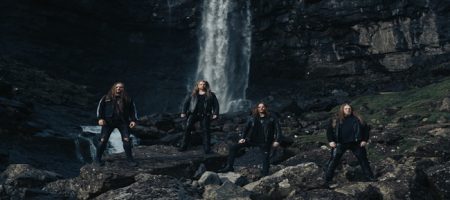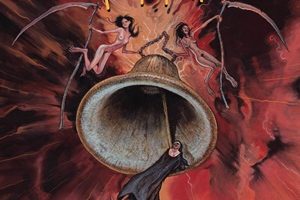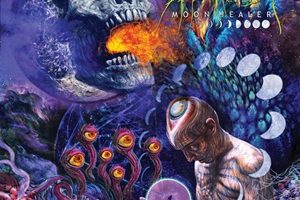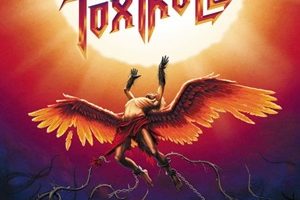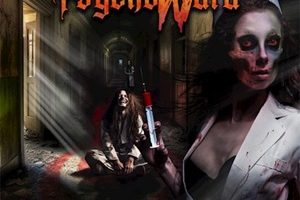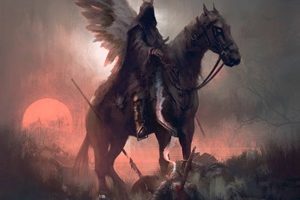Cirith Ungol – The Fire Inside
Thursday, 26th October 2023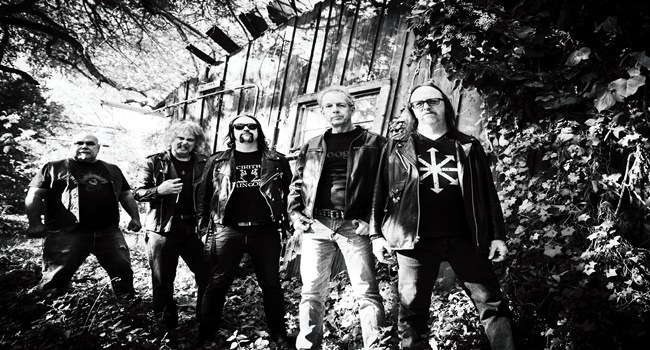
Photo: Peter Beste
When it comes to epic-oriented traditional heavy metal with elements of old school doom or NWOBHM influences, one veteran act that has always been held in cult status (or esteem) is Ventura, California’s Cirith Ungol. Proving their viability as creative musicians with new records since their resurrection in 2015, the latest album Dark Parade could be their heaviest outing to date while never sacrificing the unique qualities that have garnered them global appeal. We reached out to drummer Robert Garven to bring us up to speed for the recording of the latest record, his personal favorite songs, special festival memories, cover art talk, and future plans (editor note: this interview was conducted before their recent announcement on their social media platforms of 2024 being the last active year for the band).
Dead Rhetoric: Dark Parade is the sixth studio album for Cirith Ungol. How do you believe the songwriting and recording process went for this set of material – and how do you think this sits into the discography of the band overall?
Robert Garven: Well, that’s a question that everyone asks, and what’s so funny is I just read a review of this which was pretty good. It said like some of other albums, such as Forever Black, this sounds like it’s from the 80’s. I talked to Armand, who owns the recording studio where we recorded this yesterday, and we were laughing about that. No matter if we record our album on a tape machine or digital, we are always going to sound like the 80’s because we are from the 80’s.
To be honest if you look at it from my perspective, not much has changed from when we started out as a band. We write the material and start working on the next project as soon as the last album is finished. We do demos, we have a certain secret recipe. If I gave it out, there would be many Cirith Ungol’s sprouting out all over the world. (laughs). How can the world handle that? One theme that runs through all our albums is we always wanted to play heavy music. I know I’m the driving force behind that, but the other guys in the band feel the same way. And our goal is to create each album to be heavier than the album before it. Have we succeeded? Who knows, but that’s what we are trying to do.
Dead Rhetoric: Were there any specific songs out of the eight that came easier to write and record than others – and which song was the most challenging or took on the greatest evolution from the initial idea/demo stage to the final recording?
Garven: Yeah, that’s hard to say. All of them – when we write songs, we write songs like a master blacksmith in ancient times who would create a battle sword. We add the right alloys, we heat things up to the metal, then forge it to bring out the strength in it. I’m a stickler for good riffs. I always think Michael Whelan is going to deliver the best album art for us each time, so we have some really good, heavy riffs on this album. Some of our riffs harken back to others off our (previous) albums – to draw a thread through the evolution of the band. We have some heated arguments over how things are going to be put together, how long this is, how long that is. One of the ironic things is our songs can be longer than we originally wanted to, so we thought about that this time.
One of my favorite songs on the new album is “Sailor on the Seas of Fate”. Even though there’s a lot of doomy stuff on the album – especially with side two, a lot of end of the world type tracks. As a kid, I saw Ben Hur, there’s a rowing scene in there where Charlton Heston is chained to the rows of a Roman slave galley. There’s another guy pounding on this thing, I remember it as a drum, but it was a wooden stump with a leather cap on it, he’s trying to get the guys to row at battle speed, then ramming speed. I kept telling the other guys, forget about the lyrics, it’s about a Roman slave ship. I rarely do overdubs, but on that one when it comes to the big toms, it’s buried in there like that. We have a lot of fun on some of the songs. Side two, “Distant Shadows”, “Dark Parade”, and “Down Below”, they are all strung together as this descent into the devolution of humanity. That’s another common thread that runs through our music, how unsuccessful we’ve been as a species for just existing.
Dead Rhetoric: How much of a challenge is it as a legacy band to remain fresh and relevant with new material while hopefully not stepping on what’s already been accepted through your classic work of the 80’s/early 90’s?
Garven: Yeah, that’s funny. Someone just asked me something similar to that earlier, and they said that your band is never going to be relevant, because you are just playing old material. We still had a few more tricks up our sleeve, and when we released “Witch’s Game” people were like ‘wow, they can still write music’. Then when Forever Black the album came out, many people thought it was the best album of the year, and it sounds like it was recorded in the 1980’s. Anything we do will always sound like where we came from – and that’s not intentional.
By putting out the last two records, it shows that we at least have some fire within us. A lot of bands over the years seem like they’ve lost that intensity. We took such a long nap between when we woke up and reunited, it invigorated us to put out some new, heavier material.
Dead Rhetoric: What’s it like to have an individual like Jarvis now on bass who has such a passion, commitment, and fire for your work – beyond what he has established with Night Demon and as your manager?
Garven: If it wasn’t for him, we definitely wouldn’t have gotten back together. He put on a show here in our hometown, the Frost and Fire festival, people came from all over the world. He wanted us to get back together and play – we said no, we are too old, we broke up a long time ago. We felt like we had been treated badly by the music industry a little bit. He asked us to come to the show, check out the bands, and do a signing session. We said ok – we showed up there and we sat there for hours signing albums, pictures, all sorts of memorabilia. We thought about doing this and getting back together. Depending on whether you like the band or hate the band, you can thank him or blame him (laughs).
Dead Rhetoric: What did you think of Michael Whelan’s artwork this time around? He has a great association and acclaim with the band through his work over the years…
Garven: I think it’s amazing. I talked the band into letting me do the layout, which I did for Half Past Human, I spent days on this making it look like it was a carved piece like a caveman. We think of Michael as the Michaelangelo or Rembrandt of our time. When we first got together with the first album, I got to see the real painting in real life, and it would blow your mind. It jumps out at you, the detail to it. One little stroke shows shadows, and only people that have talent can do this. If you get a chance to go to one of his art shows, definitely do so.
Dead Rhetoric: What have been some of your favorite fan interaction stories that you’ve heard regarding Cirith Ungol and the impact that your music has made on people?
Garven: We never thought of ourselves as famous, but a lot of people have come up to us and said our music changed their lives. I was depressed, listened to your music, and it gave me hope. To us, our music is the opposite of hope. A local woman who bought our last album listened to it and cried. Our last couple of albums have had that doomy aspect to them. I’m not going to sugarcoat things, it’s what’s happening to us around the world. Are there pockets of happiness all around the world – yes. But the trend is doomy and gloomy. People always say they listen to the band – some of our fans have followed us from the beginning, and other people haven’t heard of us until we got back together. We are looking for people that have never heard of us before to at least come check us out.
Dead Rhetoric: Where do you see the greatest differences between the metal genre today versus your first go around during the early days of independent record labels and DIY tours? Has it been hard to adjust your expectations and try to appeal to multiple generations of fans?
Garven: Not really, because that goes back to our original reason for forming. We wanted to write music that we liked, based on the influences we had growing up. Black Sabbath, Blue Cheer, Steppenwolf, Cream, The Doors, things like that. Even back to the black blues, it all sprouted where rock and roll came from. We decided we were going to stay on that path. We never have tried to appeal to the masses, we’ve always tried to appeal to what we thought was true metal. In the band, we think what we are trying to play is true metal. Have we achieved that? We have to let the listener be the judge of that, but that is what we are striving to achieve. Even if we fail, we are trying our hardest to create the heaviest music that we can.
Dead Rhetoric: What is your approach to drumming like for Cirith Ungol – and who inspires/influences you when it comes to your craft and technique?
Garven: I grew up on a lot of good drummers, but I’m not like a lot of them. I was self-taught at home, I’m not a technical drummer. I’m more in the vein of Bill Ward. I’ve loved bands like Mountain, Budgie, and a lot of my heroes. More of an art form. Every time I get on stage, it’s more like performance art. I try to bring that into the music. That’s where I’m coming from.
Dead Rhetoric: When it comes to the career of Cirith Ungol, what are some of the highlights as far as records, shows, tours, festivals, or other interaction where you knew you were making an impact with your work?
Garven: Wow. That’s hard to say. Every time an album is released, and you get to hold it in your hand, that’s something. Recently we got to open for Judas Priest at Wacken. 81,000 people were there, they had giant screen televisions so you could see things from the campgrounds. Even backstage, people were sipping wine, drinking beer. We played the Chaos Descends festival in Germany, it was in the middle of a forest. There were two mountains, trees, and a little train running around out there. We got on stage, and we played that song, I could see the lights throbbing, the stars, the moon, the mountains, I felt like the crowd was throbbing and could hear them chanting the chorus over the band. To me, that blew me away, it was a great moment in my career.
Dead Rhetoric: What are some of your passions, hobbies, and interests that you have away from music when you have the free time and energy to pursue them?
Garven: Most people know I’m a big car fan. I have a couple of old Ferraris, and I like taking them apart, putting them back together. There are connections between drummers and cars, Nick Mason also has a giant collection of Ferraris in England. What I love about it is the sound of the engine. I still do art. That’s my life, Ferraris and heavy metal.
Dead Rhetoric: Where do you see the differences between the state of heavy metal stateside versus other parts of the world?
Garven: I don’t think there’s any difference in appreciation, it all has to do with the geography. There are people in our country that are the biggest heavy metal supporters in the world, the problem is the country is big, and spread out. You can fly from Germany to Italy to Sweden all within a couple of hours, the people can attend more festivals and concerts because things are closer. It’s hard for us to get over to Europe – we have to fly there, takes three days to get used to things, play a show or two, then fly home. Some people can’t even believe we do that.
Cirith Ungol could probably fill a venue, but every seat would be filled with a person from a different city across the country. That’s the hardest thing I see in the United States. It can happen, but definitely in Europe they have this closer knit, metal community. A lot of the fans over there are younger. When we play over in Europe, we have a lot of fans under the age of thirty. I’m glad to see a newer generation getting into metal.
Dead Rhetoric: What’s on the agenda for the next year or so for activities related to Cirith Ungol? And what’s left in your mind on the bucket list to accomplish – either with the band or on your own personal endeavors?
Garven: We want to get out there and play some shows. There’s no secret, we are getting older. Every show could be our last show, every album could be our last album. We just saw Bruce Springsteen cancelling shows, and other people are doing it too because they are old. We will keep playing until the wheels fall off. We want to keep pulling away. We are super excited about the new album release.











